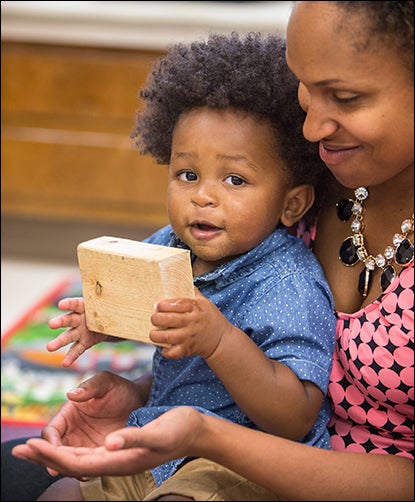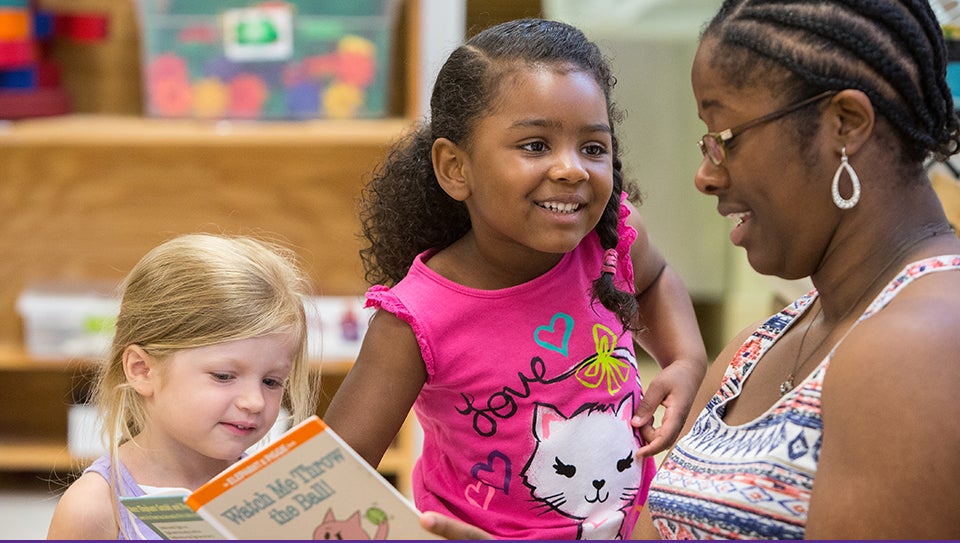AT DARDEN CENTER
ECU students learn by experiencing early childhood education
Gray skies and a day-long drizzle prompted a science lesson in teacher Jessica Pate’s preschool classroom in the East Carolina University Nancy Darden Child Development Center.
“After it rains, the water evaporates and fills the cloud,” Pate said. “Then it rains again,” she said. “That is the water cycle.”

Preschooler Ainsley Taylor learns through play at the ECU center.
Teachers like Pate integrate play time and teaching throughout the day. They also mentor ECU students who get real-world experience working with children.
The on-campus center provides early childhood education and care for 51 children ranging in age from three months to five years. At the same time, ECU students learn about child development and best practices for teaching young children.
The center, directed by Julie Fowler, is housed in the Department of Human Development and Family Science, formerly Child Development and Family Relations, in the College of Health and Human Performance.
All four classrooms are staffed with a lead teacher and an assistant who hold a bachelor’s degree in a child development related field.
The center is unique from others in the community because it’s also a learning lab for ECU students Fowler said.
“When parents look into the classroom they are not seeing two adults with preschool children,” Fowler said. They are seeing four or five adults.”
Students represent multiple disciplines including birth through kindergarten teacher education, child life, family and community services, foreign languages and literatures, communication sciences and disorders, and theater arts.

ECU junior Maddy Day reads “Goodnight Moon” to Grant Zou. Day is majoring in child life.
“There is no substitute for real-world experience supervised by professionals to provide our students with the best possible education,” said Dr. Glen Gilbert, dean of the College of Health and Human Performance. “The center is an outstanding example of this approach.”
Many students are overwhelmed their first day, Fowler said. “Students read text and see photographs in their textbooks but when they come to the center and see reality, they realize they have been reading about one child, and now they see 17 of them.”
Students learn that every day is different and that all interventions do not work for all children, Fowler said.
ECU family and community services major Curtis Hill of Mount Gilead agreed the most challenging was the initial exposure to the classroom.
“During that transition you get exposed to situations that either build your confidence or cause you to question it,” Hill said. “The main thing is to keep focused and try to learn from each situation. Once that confidence is built, the classroom becomes like home.”
Faculty member Susannah Berry serves as the liaison for the center and the department. Her role includes student placement and insuring classroom curriculum is put into practice in the center.
“Students see that what we teach in class is not just words in a book,” Berry said. “It is real life,” she said.

Toddler Kyrin Quinitchett enjoys playing with blocks with the assistance of Brandi Harris, lead teacher in the toddler classroom.
The educational program is designed to help children develop physically, intellectually, emotionally, and socially and follows developmentally appropriate practices established by the National Association for the Education of Young Children. Classrooms are divided into learning centers such as blocks, dramatic play, art and science. Children learn that they are free to make choices as long as they stay within the limits of consideration for people and things.
The toddler and preschool classrooms are equipped with observation booths that have a one-way mirror and headsets, which allow observers to see and hear interactions in the classrooms. Visitors who want to observe the infant classroom have virtual access from the preschool observation booth.
“Parents can come in any time of the day and not interrupt their child,” Fowler said. “That is part of the attraction for parents.”
The center holds a five-star rated childcare license issued by the Division of Child Development, North Carolina Department of Health and Human Services and is nationally accredited.
Open to the public, the center operates year-round, Monday through Friday. Participants pay a fee, which supports the non-profit center.
ECU Joyner Library technician Margaret Earley-Thiele has two children, August and Skeeter, enrolled. She said staff helped her children improve their socialization, communication, gross and fine motor skills.
“They are methodical and consistent and that is so important for young children,” Earley-Thiele said. “The individual attention that each child receives and the lessons they learn are priceless.”
For more information on the center, please contact Julie Fowler at fowlerj@ecu.edu.

Playtime at the center is preschool teacher Jessica Pate, left, with preschooler and budding chef Olivia Flowers.
